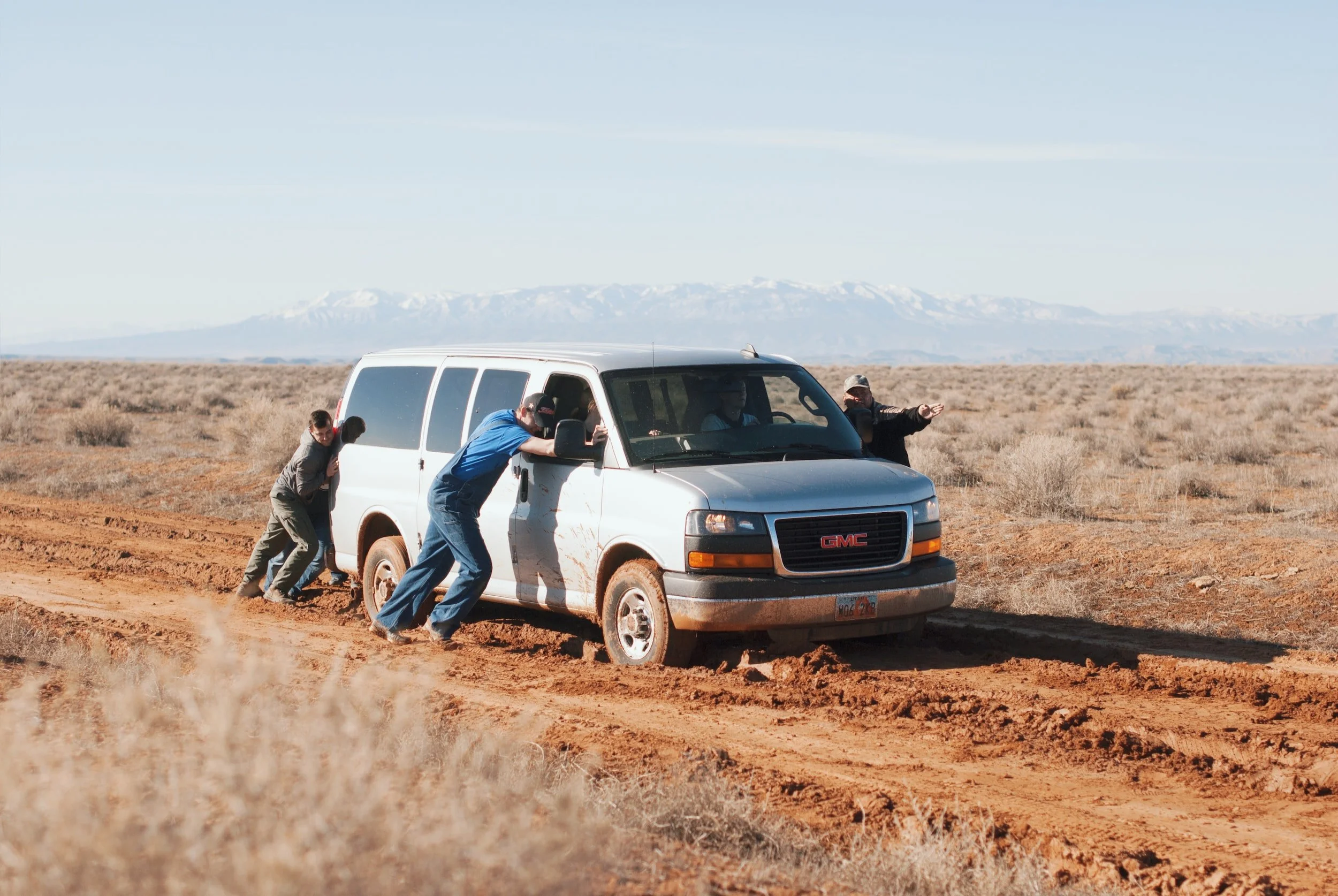How to Stay Out of Ditches (and what to do if you're already in one)
Are you in a rut? Or are you stuck in a ditch?
The other day I saw a car that had completely slid off the road, the front tires down an embankment. Rear wheels were up in the air.
Oof.
This car was stuck. Big time stuck. The only way out was going to be a tow truck.
The ability to get out of ruts.
It’s possible to maneuver your way out of a rut.
Make a change.
Mix it up a little.
Find an alternative path.
Get a hobby.
Change your habits.
But this is stuck in a ditch.
We stop hitting goals.
Our organizational culture is all wrong.
The mission is off-putting.
The vision is fuzzy.
We can’t move.
Forward or backward.
People (and entire organizations) get stuck in ditches and like the car I saw the other day. It’s not pretty. When you’re in a ditch, it’s tough to figure your way out. The best way to get out of a ditch is to avoid getting into one.
Here’s how I recommend doing that
Make sure you can see
You need a vision that grows from purpose.
People find themselves waylaid because they have no vision. Most people end up in a ditch when they can’t see what’s in front of them. But the problem is often much deeper than that.
People need a purpose. Few have taken the time to discover their purpose. Lack of clarity on purpose and vision is like fog on the windshield. Keep going like that and I guarantee you a hopelessly difficult ditch.
But you can find your way out of the ditch with a clear picture of why you exist.
What is the change you want to make?
What is the world in which you want to live?
Learn to see. It makes all the difference.
Heed the guard rails
Especially when there are no guardrails.
We were recently traveling a windy road in the mountains with a steep embankment on the passenger side. Sometimes there were guard rails, sometimes there were not.
Pay attention to the warnings.
Too many people move through life paying attention to all the wrong things. We measure life by income or promotions. How many days until vacation, or at least until the weekend? One-dimensional measurement will put us in a ditch every time.
The most helpful guard rail I know is “The Eisenhower Matrix”.
There are two kinds or categories of tasks in our lives:
Important tasks and Urgent tasks.
Important tasks are mission critical — the things that contribute to our long-term mission, values, and goals. Urgent tasks the ones with impending deadlines.
So it’s possible to live your life in one of four quadrants — and three out of four quadrants end in a ditch.
- The ditch of burnout: Everything is important. Everything is urgent. If you are living here, there is an end to this road. You are toast. It’s an unsustainable way to live. I know too many people stuck in the burnout ditch.
- The ditch of distraction: These are the people who are primarily doing urgent, but not necessarily important, things all day. There comes a day when a person must realize that their primary job is probably not email and text messages. We live in the age of distraction. It’s an easy ditch to fall into - and can be quite difficult to get out of.
- The ditch of nowhere: Anyone who mostly does unimportant, non-urgent things is just going to be stuck, tires spinning in their own driveway. Stop prioritizing Netflix, Instagram, and Call of Duty. Prioritize building skills and learning expertise.
You will stay out of ditches if you mostly do important but non-urgent tasks. This moves you down the road of thriving.
Look at your daily activities.
Track your time.
What are your habits?
Your activities and habits are the road signs and guard rails. Take warning.
As you work to stay on the road of thriving, you’ll move away from ditches sooner than expected.
Maintain your car
When I am coaching and training the Growability® model with clients, I often talk about the fact that leading an organization is a lot like riding a bicycle. There’s always a lot going on. Pedaling and steering, while balancing, avoiding potholes, and looking out for oncoming traffic.
When the tire gets flat or the chain falls off, you can’t keep riding and fix the problem at the same time. Get off the bike to work on the bike.
Get out of the car, to maintain the car. My car needs brakes. I can’t just keep driving it. I have to take it to a shop and get the brakes fixed. Driving a car with bad brakes will put you in a ditch you don’t want to be in.
As a leader (and as a human), stop and work on yourself sometimes. You can’t just “keep going” hoping the problem will maintain itself.
Stop. Work on the car.
Weekly: schedule a time to plan and reflect.
Monthly: think about what you need to accomplish in the month ahead.
Quarterly: consider your goals. Celebrate what you’ve accomplished and lay out where you’d like to be in three months.
Annually: revisit your purpose. What kind of progress are you making toward your vision?
These maintenance habits, like an oil change or a brake job are the habits that keep you out of ditches.
When you’re in a ditch, you need a tow truck.
If you find yourself in a ditch, you probably need a coach.
A coach can help you clarify vision, determine your personal guard rails, and help you think through a custom maintenance schedule.
There is no reason anyone should be stuck in a ditch alone.
You should get help. A Growability® Coach can help pull you out. This is how you learn to:
- Clarify vision
- Develop healthy habits
- Help you get on a personalized maintenance schedule that works for you.
Reach out and let’s talk sometime.
In the meantime, remember:
You are doing better than you think.
You have more potential than you know.

